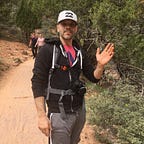#41: The way a storyteller begins is no accident.
Currently, I’m in the planning stages (mentally at least) of my next book, and as a result, I am paying extra close attention to the way stories begin. The first lines and paragraphs of a book or the opening shots and scenes of a movie have the power to grab your attention or fleet your interest.
In his seminal work The Hero with a Thousand Faces, mythologist Joseph Campbell famously outlines the journey of the hero. In this text, Campbell synthesizes myths from multiple texts and cultures throughout human history to create the multistep “The Hero’s Journey,” a cycle in which all heroes partake. In the first step, “The Call to Adventure,” Campbell gives examples of the way a monomyth begins and states, “A blunder — apparently the merest of chance — reveals an unsuspecting world, and the individual is drawn into a relationship with forces that are not rightly understood.” While not every story fits perfectly into Campbell’s journey, most stories center around a character that needs to learn some sort of lesson or deal with some type of flaw that requires him or her to grapple with “forces that are not rightly understood.” These forces are sometimes supernatural, but they can be “forces” that we all experience in day-to-day life.
We need to look no further than George Lucas’s Star Wars to see how “The Call to Adventure” surfaces in a hero’s journey. Lucas is the first to admit that he took Campbell’s cycle and used it as a template for Luke Skywalker. Luke experiences his call when two droids show up to his uncle’s moisture farm, and the death of his aunt and uncle thrust him into the adventure. However, Star Wars does not start here.
In its opening scene, Star Wars begins by showing us a moon off in the distance. The camera then pans down to show a piece of a planet’s atmosphere. Just then, this scenic space portrait is interrupted by a fleeing ship. As the small ship passes over the atmosphere, we see lasers being shot in its direction from an even larger spaceship that takes up most of the frame. Here, in film’s opening thirty sections we are dropped into this conflict forcing us to ask, “who is being shot at?” and “who does this massive ship belong to?” These questions are eventually answered throughout the film, and they play a part in the overall story. While these scenes will lead to Luke’s call, the story doesn’t just simply start there; it needs to build up to it.
Written stories also open in their own unique ways. Andy Weir’s The Martian start with its main character announcing, “I’m pretty much fucked.” This makes us ask, “Why?” Ray Bradbury starts Fahrenheit 451 with, “It was a pleasure to burn” in a similar way to Weir. George Orwell plays with our expectations by beginning with “It was a cold day in April and the clocks were striking thirteen.” Even the great American novel The Great Gatsby begins in a unique way. F. Scott Fitzgerald brings us in with some advice given to the narrator: “In my younger and more vulnerable years, my father gave me some advice that I’ve been turning over in my mind ever since. Whenever you feel like criticizing anyone, he told me, just remember that all the people in this world haven’t had the advantages you’ve had.” Opening with the character reflecting on his father’s advice causes us to do the same.
Immersive and intriguing openings are even found in simple children’s books, too. One of my daughter’s favorite bedtime stories is Bear Has a Story to Tell by Philip and Erin Stead. The story begins and ends with Bear, the main character, rubbing the sleep from his eyes with the text saying, “It was almost winter and bear was getting sleepy.” The story begins here and takes us through Bear’s journey which ultimately ends in the same place.
These are, of course, just a few ways that an author and storyteller can begin a story. No matter the method, one thing is clear: the way a storyteller begins is no accident. This is something I’ll keep in mind as I start to write my next story.
Thanks for reading.
Originally published at https://toffolo.substack.com on April 3, 2022.
